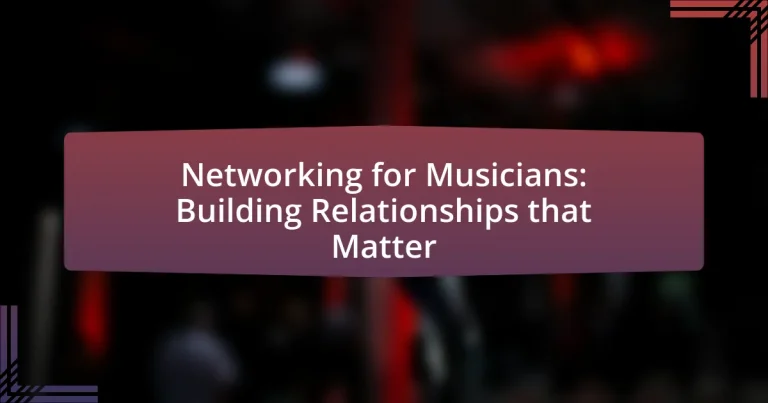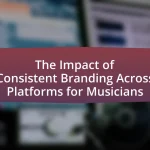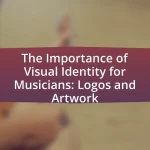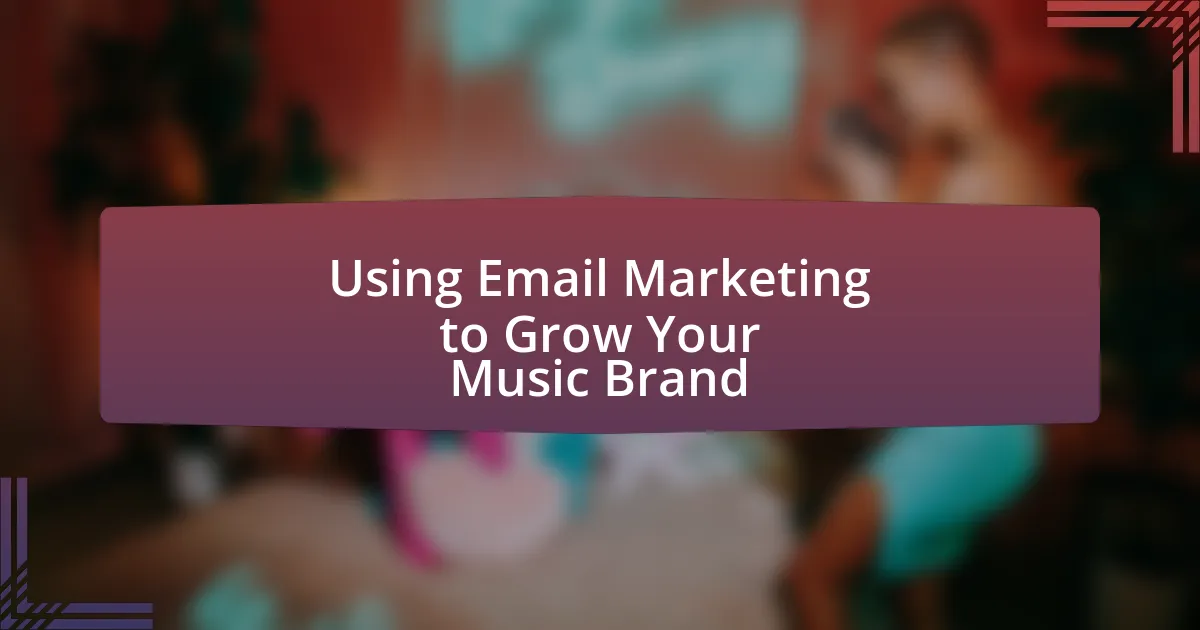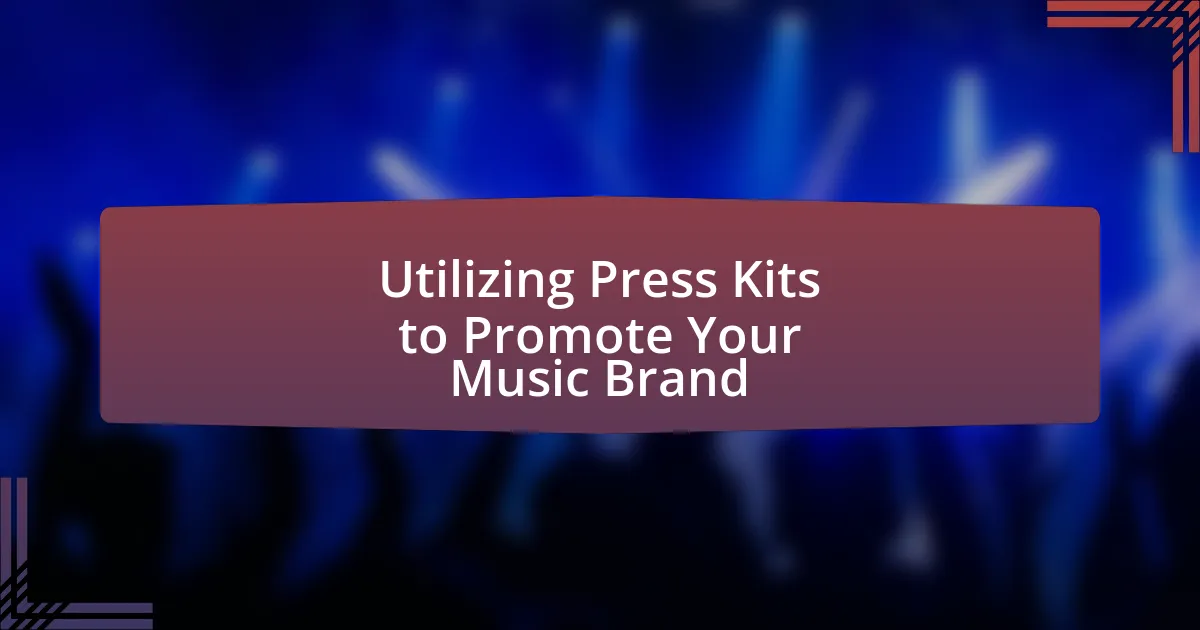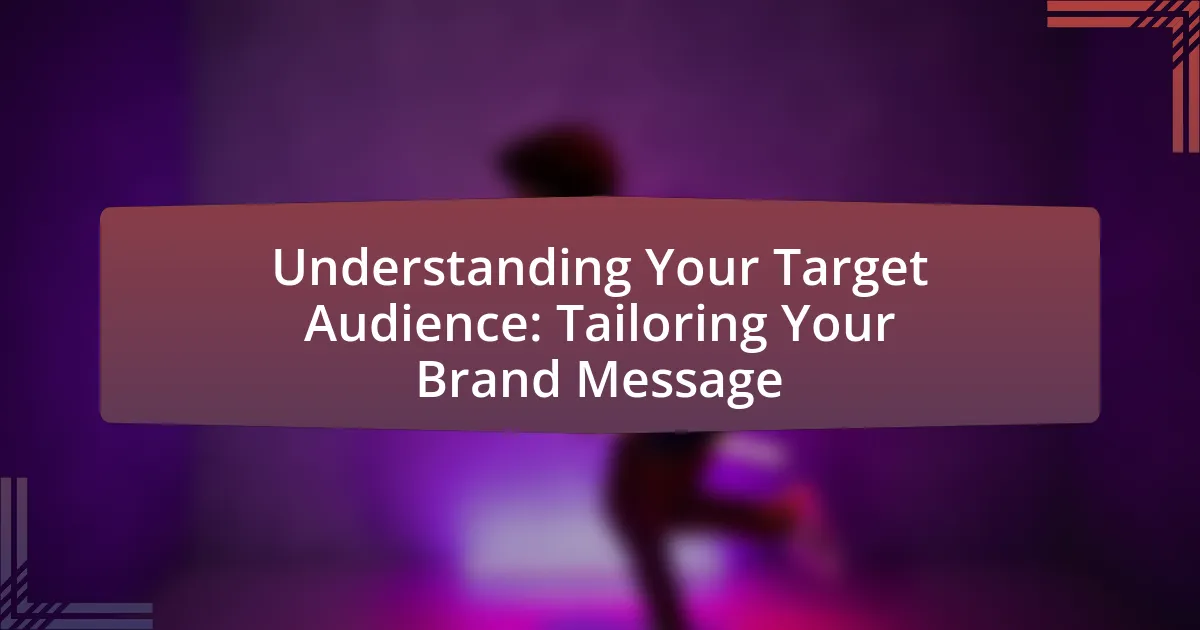Networking for musicians is the process of establishing and nurturing professional relationships within the music industry to create opportunities for collaboration, performance, and career advancement. The article emphasizes the importance of networking, highlighting that 70% of musicians attribute their success to these connections, which can lead to gigs, partnerships, and increased visibility. It discusses common misconceptions about networking, the types of relationships musicians should focus on, and strategies for effective networking, including leveraging social media and participating in live events. Additionally, the article addresses challenges musicians face in networking, such as competition and social anxiety, while offering practical tips for overcoming these barriers and maintaining valuable connections.
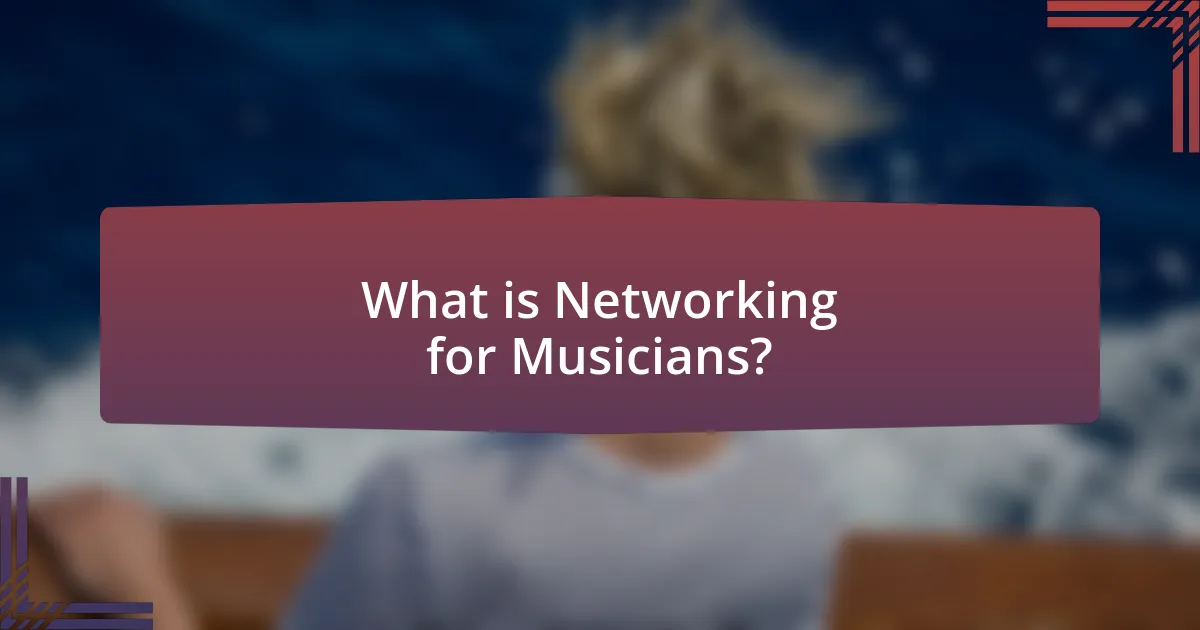
What is Networking for Musicians?
Networking for musicians is the process of establishing and nurturing professional relationships within the music industry to create opportunities for collaboration, performance, and career advancement. This practice is essential as it allows musicians to connect with other artists, producers, venue owners, and industry professionals, which can lead to gigs, partnerships, and increased visibility. Research indicates that 85% of jobs are filled through networking, highlighting its importance in career development across various fields, including music.
Why is networking important for musicians?
Networking is important for musicians because it facilitates opportunities for collaboration, exposure, and career advancement. By building relationships within the music industry, musicians can connect with producers, promoters, and other artists, which can lead to gigs, partnerships, and increased visibility. For instance, a study by the Berklee College of Music found that 70% of musicians attribute their success to networking, highlighting its critical role in career development.
How does networking impact a musician’s career?
Networking significantly impacts a musician’s career by providing opportunities for collaboration, exposure, and access to industry resources. Through networking, musicians can connect with producers, other artists, and industry professionals, which can lead to joint projects, performances, and increased visibility. For instance, a study by the Berklee College of Music found that 70% of musicians attribute their career advancements to networking efforts, highlighting its critical role in securing gigs and building a fan base. Additionally, networking can facilitate mentorship opportunities, allowing emerging musicians to learn from established artists, further enhancing their career trajectory.
What are the common misconceptions about networking in music?
Common misconceptions about networking in music include the belief that networking is solely about self-promotion and that it requires a large social circle. Many musicians think that networking is only beneficial for those with established connections, while in reality, building genuine relationships can be valuable for artists at any stage. Additionally, some believe that networking is a one-time event rather than an ongoing process of relationship-building. Research shows that effective networking leads to collaborations and opportunities, emphasizing the importance of authenticity and mutual support in the music community.
What types of relationships should musicians focus on building?
Musicians should focus on building relationships with industry professionals, fellow musicians, and their audience. Industry professionals, such as producers, managers, and booking agents, can provide essential support and opportunities for career advancement. Fellow musicians can offer collaboration opportunities, creative inspiration, and a sense of community, which is vital in a competitive field. Engaging with the audience fosters loyalty and can lead to a dedicated fan base, which is crucial for long-term success. These relationships are supported by the fact that networking is a key factor in the music industry, as evidenced by numerous successful artists who attribute their achievements to strong connections within these groups.
Who are the key players in a musician’s network?
The key players in a musician’s network include managers, agents, producers, fellow musicians, venue owners, promoters, and music industry professionals. Managers oversee the musician’s career and business decisions, while agents secure performance opportunities. Producers play a crucial role in the recording process, and fellow musicians can provide collaboration and support. Venue owners and promoters are essential for organizing live performances, and music industry professionals, such as publicists and marketing experts, help in promoting the musician’s work. Each of these players contributes to the musician’s success by facilitating opportunities, providing resources, and enhancing visibility within the industry.
How can musicians identify valuable connections?
Musicians can identify valuable connections by actively engaging in industry events, utilizing social media platforms, and collaborating with other artists. Attending concerts, workshops, and music festivals allows musicians to meet industry professionals and peers, fostering relationships that can lead to opportunities. Social media platforms like Instagram and LinkedIn enable musicians to connect with influencers, producers, and other musicians, expanding their network. Collaborating on projects with other artists not only enhances creativity but also builds trust and rapport, making it easier to identify and nurture valuable connections. Research indicates that networking significantly impacts career advancement in the music industry, as relationships often lead to referrals and collaborative opportunities.
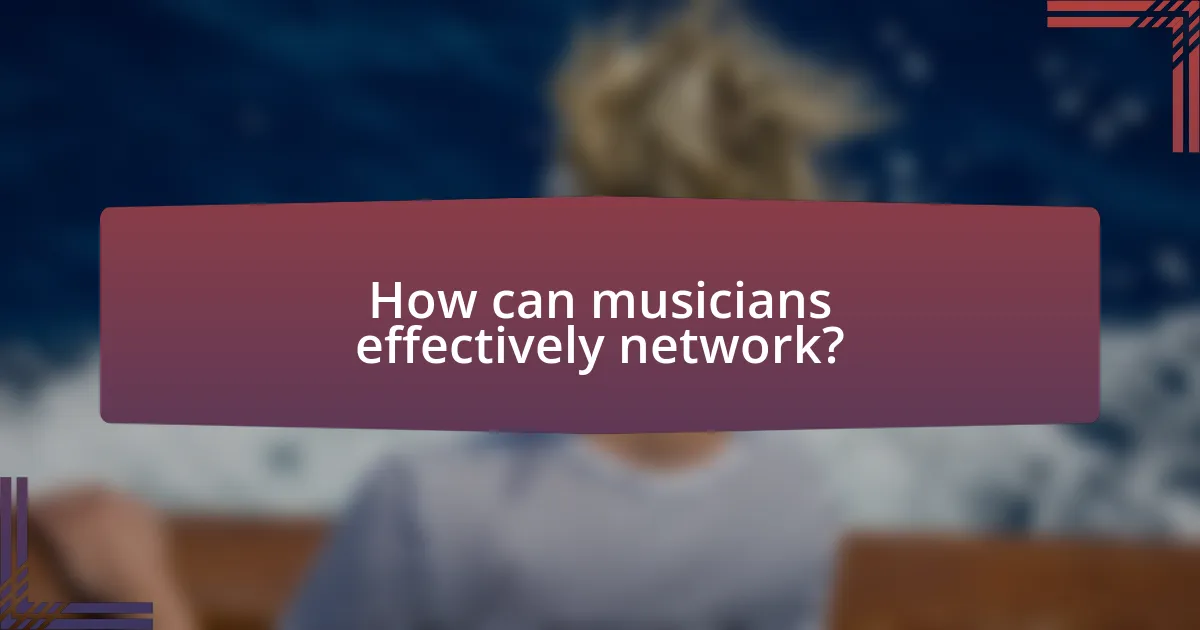
How can musicians effectively network?
Musicians can effectively network by actively participating in music events, collaborating with other artists, and utilizing social media platforms. Engaging in live performances, open mics, and industry conferences allows musicians to meet peers and industry professionals, fostering valuable connections. Collaborating on projects or songs with other musicians not only enhances creativity but also expands one’s network through shared audiences. Additionally, leveraging social media platforms like Instagram, Twitter, and LinkedIn enables musicians to showcase their work, interact with fans and industry figures, and stay informed about opportunities. According to a study by the Berklee College of Music, 70% of musicians reported that networking played a crucial role in their career advancement, highlighting the importance of building relationships in the music industry.
What strategies can musicians use to build relationships?
Musicians can build relationships by actively engaging in networking opportunities, collaborating with other artists, and utilizing social media platforms. Networking events, such as music festivals and industry conferences, provide musicians with the chance to meet industry professionals and fellow artists, fostering connections that can lead to future collaborations or gigs. Collaborating on projects allows musicians to share their skills and expand their reach, creating a mutual benefit that strengthens relationships. Additionally, social media platforms like Instagram and Twitter enable musicians to interact with fans and industry peers, promoting a sense of community and engagement. These strategies are effective as they create opportunities for visibility and partnership, essential for career growth in the music industry.
How can social media be leveraged for networking?
Social media can be leveraged for networking by enabling musicians to connect with industry professionals, fans, and other artists through platforms like Instagram, Twitter, and LinkedIn. These platforms allow musicians to showcase their work, engage with their audience, and participate in conversations relevant to their genre, which can lead to collaborations and opportunities. For instance, a study by the Pew Research Center found that 72% of adults use social media, making it a vital tool for reaching a broad audience and establishing professional relationships. By actively sharing content, participating in discussions, and following industry leaders, musicians can enhance their visibility and create meaningful connections that can advance their careers.
What role do live events play in networking for musicians?
Live events are crucial for networking among musicians as they provide direct opportunities for face-to-face interactions, collaboration, and relationship building. These events, such as concerts, festivals, and open mics, allow musicians to meet industry professionals, including producers, agents, and fellow artists, fostering connections that can lead to future collaborations or gigs. According to a survey by the Music Industry Research Association, 70% of musicians reported that live performances significantly contributed to their networking efforts, highlighting the importance of these events in establishing a professional presence in the music industry.
How can musicians maintain and nurture their network?
Musicians can maintain and nurture their network by regularly engaging with contacts through social media, attending industry events, and collaborating on projects. Consistent interaction helps reinforce relationships, as studies show that frequent communication increases trust and connection among peers. For instance, musicians who actively participate in online discussions or share each other’s work are more likely to receive support and opportunities in return, as evidenced by the collaborative nature of the music industry where partnerships often lead to greater exposure and success.
What are effective follow-up techniques after initial meetings?
Effective follow-up techniques after initial meetings include sending a personalized thank-you email, summarizing key discussion points, and proposing next steps. Personalizing the email reinforces the connection made during the meeting, while summarizing key points demonstrates active listening and understanding. Proposing next steps keeps the momentum going and shows initiative. Research indicates that timely follow-ups, ideally within 24 to 48 hours, significantly increase the likelihood of maintaining engagement, as noted in studies on professional networking effectiveness.
How can musicians provide value to their connections?
Musicians can provide value to their connections by sharing their expertise, collaborating on projects, and offering promotional support. By sharing knowledge about music production, songwriting, or performance techniques, musicians enhance the skills of their peers. Collaborating on music or events creates opportunities for mutual growth and exposure. Additionally, promoting each other’s work through social media or live performances can significantly increase visibility and reach, benefiting all parties involved. Research indicates that networking and collaboration in the music industry can lead to increased opportunities and success, as seen in studies highlighting the importance of social capital among artists.
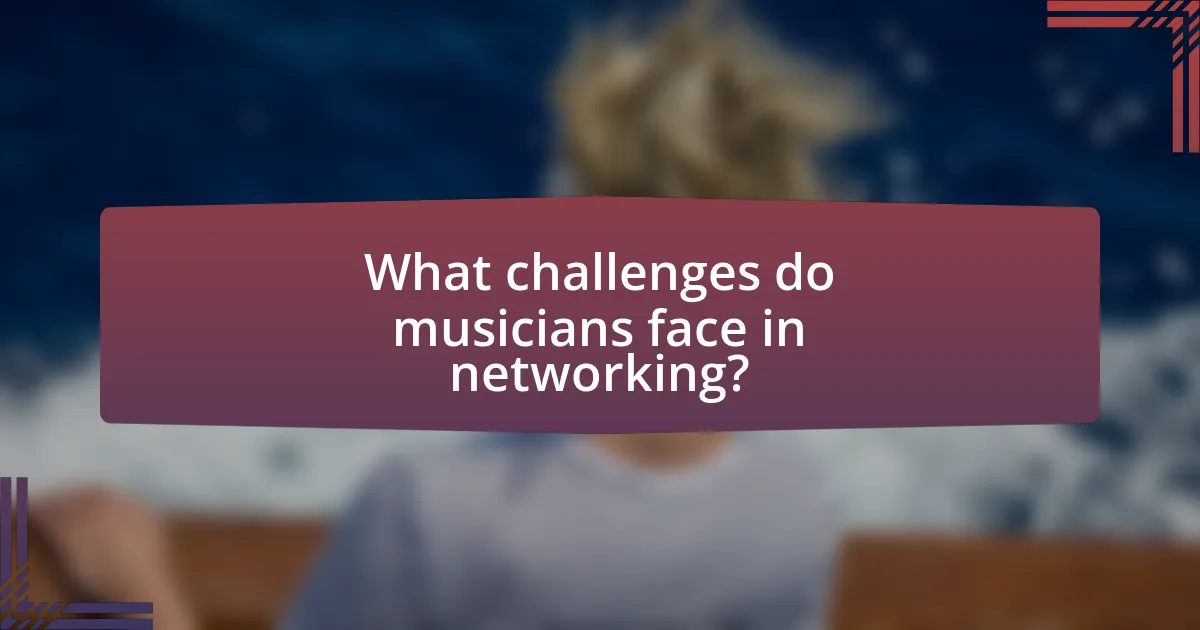
What challenges do musicians face in networking?
Musicians face several challenges in networking, primarily including lack of access to industry contacts, difficulty in establishing genuine connections, and competition among peers. The limited access to influential figures in the music industry can hinder a musician’s ability to secure opportunities for collaboration or performance. Additionally, many musicians struggle to create authentic relationships due to the transactional nature of networking events, which can lead to superficial interactions rather than meaningful connections. Furthermore, the high level of competition in the music scene can make it challenging for individual musicians to stand out and be remembered by potential collaborators or industry professionals. These factors collectively contribute to the difficulties musicians encounter in effectively networking within their field.
What are the common barriers to effective networking for musicians?
Common barriers to effective networking for musicians include lack of confidence, limited access to industry events, and inadequate social skills. Musicians often struggle with self-doubt, which can hinder their willingness to approach others and initiate conversations. Additionally, many musicians may not have the financial means or connections to attend key industry events, limiting their opportunities to meet influential figures. Furthermore, some musicians may lack the necessary social skills to engage effectively, making it difficult to establish meaningful relationships. These barriers collectively impede musicians’ ability to build valuable networks within the industry.
How can musicians overcome shyness or social anxiety?
Musicians can overcome shyness or social anxiety by gradually exposing themselves to social situations and practicing their performance skills in low-pressure environments. This method, known as systematic desensitization, helps reduce anxiety over time. Research indicates that repeated exposure to anxiety-inducing situations can lead to decreased fear responses, as shown in studies on social anxiety disorder. Additionally, engaging in group activities, such as joining a band or attending workshops, fosters a sense of community and support, which can further alleviate feelings of isolation and anxiety.
What strategies can help musicians deal with rejection?
Musicians can effectively deal with rejection by adopting a mindset focused on resilience and continuous improvement. This involves viewing rejection as a learning opportunity rather than a personal failure, which can enhance their artistic growth and emotional strength. Research indicates that resilience is linked to better performance outcomes; for instance, a study published in the Journal of Personality and Social Psychology found that individuals who embrace challenges and learn from setbacks tend to achieve higher levels of success in their fields. Additionally, musicians can benefit from seeking constructive feedback from peers and mentors, which can provide valuable insights and foster a supportive network that mitigates the emotional impact of rejection. Engaging in regular self-reflection and maintaining a strong support system can further help musicians navigate the challenges of rejection effectively.
How can musicians adapt their networking approach in a digital age?
Musicians can adapt their networking approach in a digital age by leveraging social media platforms and online collaboration tools to connect with peers and audiences. Utilizing platforms like Instagram, TikTok, and Twitter allows musicians to showcase their work, engage with fans, and build a personal brand. Additionally, participating in virtual events, webinars, and online music communities fosters relationships with industry professionals and fellow artists. According to a 2021 survey by the Music Industry Research Association, 70% of musicians reported that social media significantly impacted their networking opportunities, highlighting its effectiveness in the modern music landscape.
What online platforms are best for musicians to network?
The best online platforms for musicians to network include SoundCloud, Bandcamp, Facebook, Instagram, and LinkedIn. SoundCloud allows musicians to share their music and connect with other artists and fans, fostering collaboration and feedback. Bandcamp provides a platform for musicians to sell their music and merchandise while engaging with their audience. Facebook and Instagram serve as social media platforms where musicians can build their brand, share updates, and connect with fans and industry professionals. LinkedIn offers a more professional networking environment, enabling musicians to connect with industry insiders, potential collaborators, and opportunities for growth. These platforms are widely recognized in the music industry for facilitating connections and collaborations among musicians.
How can virtual events enhance networking opportunities?
Virtual events enhance networking opportunities by providing accessible platforms for musicians to connect with industry professionals and peers regardless of geographical limitations. These events often feature interactive elements such as breakout rooms, chat functions, and live Q&A sessions, which facilitate real-time engagement and relationship building. According to a report by Eventbrite, 80% of event attendees feel that virtual events allow for better networking opportunities compared to in-person events, as they can easily reach out to speakers and other participants without the barriers of physical presence. This accessibility and interactivity create a conducive environment for musicians to forge meaningful connections and collaborations.
What are the best practices for successful networking as a musician?
The best practices for successful networking as a musician include actively participating in music events, utilizing social media effectively, and building genuine relationships. Musicians should attend concerts, open mics, and industry conferences to meet peers and industry professionals, which fosters connections that can lead to collaborations and opportunities. Effective use of social media platforms, such as Instagram and Twitter, allows musicians to showcase their work, engage with fans, and connect with other artists, enhancing their visibility and reach. Building genuine relationships involves being authentic, supportive, and reciprocal in interactions, which can lead to long-lasting professional ties. Research indicates that networking is crucial in the music industry, as 70% of jobs are found through networking, highlighting its importance for musicians seeking to advance their careers.
How can musicians create a personal brand that attracts connections?
Musicians can create a personal brand that attracts connections by clearly defining their unique musical identity and consistently communicating it across various platforms. This involves identifying their genre, style, and values, which helps in differentiating them from others in the industry. For instance, a study by the Berklee College of Music highlights that musicians who effectively convey their personal stories and artistic vision are more likely to engage audiences and industry professionals. Additionally, utilizing social media strategically to share content that reflects their brand, such as behind-the-scenes footage, personal anecdotes, and music releases, fosters a deeper connection with fans and collaborators. Engaging with followers through comments and live sessions further enhances this relationship, making the brand more relatable and accessible.
What tips can help musicians make a lasting impression?
Musicians can make a lasting impression by developing a unique personal brand that reflects their artistic identity. This involves creating a consistent visual and auditory style across performances, social media, and promotional materials, which helps audiences recognize and remember them. Additionally, engaging authentically with fans and industry professionals fosters meaningful connections; studies show that personal interactions can significantly enhance audience loyalty and word-of-mouth promotion. For instance, musicians who actively respond to fan messages and participate in community events often see increased support and attendance at their shows.
